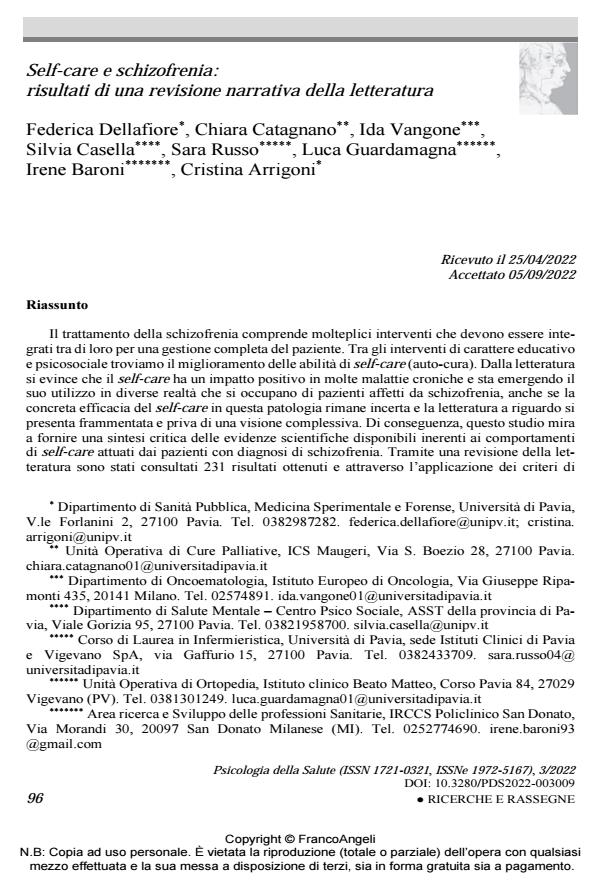Self-care and schizophrenia: results of a narrative review of the literature
Journal title PSICOLOGIA DELLA SALUTE
Author/s Federica Dellafiore, Chiara Catagnano, Ida Vangone, Silvia Casella, Sara Russo, Luca Guardamagna, Irene Baroni, Cristina Arrigoni
Publishing Year 2022 Issue 2022/3
Language Italian Pages 22 P. 96-117 File size 326 KB
DOI 10.3280/PDS2022-003009
DOI is like a bar code for intellectual property: to have more infomation
click here
Below, you can see the article first page
If you want to buy this article in PDF format, you can do it, following the instructions to buy download credits

FrancoAngeli is member of Publishers International Linking Association, Inc (PILA), a not-for-profit association which run the CrossRef service enabling links to and from online scholarly content.
The treatment of schizophrenic disorders includes multiple interventions that must be inte-grated with each other for the complete management of the patient. Among the interventions of an educational and psychosocial nature we find the improvement of self-care behaviors. From the literature, it is clear that self-care has a positive impact on health and psychosocial out-comes of patients with chronic diseases and its studies is emerging in different realities that deal with patients with schizophrenia, even if the concrete effectiveness of self-care in this pathology remains uncertain and the literature in this regard is fragmented and devoid of an over-all vision. Consequently, this study aims to provide a critical synthesis of the available scien-tific evidence regarding self-care behaviors performed by patients diagnosed with schizophre-nia. Through a review of the literature, the 231 results obtained were examined and 7 articles were selected through the application of the inclusion criteria. Three macro-themes have been identified: (a) the levels of self-care implemented by patients with schizophrenia; (b) the factors influencing this process; (c) educational interventions that have been shown to have an effect and efficacy for developing self-care behaviors. Self-care in the patient suffering from schizophrenia is a fundamental therapeutic tool, however it needs to be deepened with new primary studies, in order to provide a clear vision on the methods of intervention to satisfy the patient’s needs, thus limiting the complications related to the disease and giving these people back a satisfactory quality of life.
Keywords: educational interventions, schizophrenia, self-care, self-management
Federica Dellafiore, Chiara Catagnano, Ida Vangone, Silvia Casella, Sara Russo, Luca Guardamagna, Irene Baroni, Cristina Arrigoni, Self-care e schizofrenia: risultati di una revisione narrativa della letteratura in "PSICOLOGIA DELLA SALUTE" 3/2022, pp 96-117, DOI: 10.3280/PDS2022-003009